

A Gateway For Capacity Development. Center for Nonprofit Management, Kellogg School of Management. Sorry, the page you requested, could not be found.
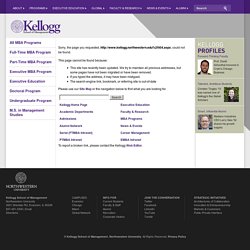
This page cannot be found because: This site has recently been updated. We try to maintain all previous addresses, but some pages have not been migrated or have been removed. If you typed the address, it may have been mistyped. The search-engine link, bookmark, or referring site is out-of-date Please use our Site Map or the navigation below to find what you are looking for.
To report a broken link, please contact the Kellogg Web Editor. Accounting Standards Board. Bridging the two disciplines of strategy and finance - Ashridge. The Nonprofit Chief Financial Officer. Building Leadership “In the for-profit sector, the “F” in CFO is what’s important.
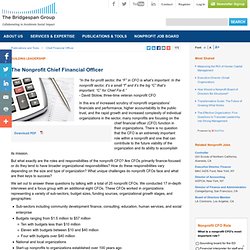
In the nonprofit sector, it’s a small “f” and it’s the big “C” that’s important. “C” for Chief Fix-It.” - David Stolow, three-time veteran nonprofit CFO In this era of increased scrutiny of nonprofit organizations’ financials and performance, higher accountability to the public trust, and the rapid growth and increased complexity of individual organizations in the sector, many nonprofits are focusing on the chief financial officer (CFO) function in their organizations.
There is no question that the CFO is an extremely important role within a nonprofit and one that can contribute to the future viability of the organization and its ability to accomplish its mission. But what exactly are the roles and responsibilities of the nonprofit CFO? We set out to answer these questions by talking with a total of 25 nonprofit CFOs. The individual CFOs represented a diversity of backgrounds, education, and tenures: 1. Understanding Accounts - Basic Finance for Non-Financial Managers - Career Development from MindTools. Basic Finance for Non-Financial Managers Knowing your way around a spreadsheet can help your career. © iStockphoto/leventince It's not just accountancy specialists who deal with spreadsheets, and figures, and the financial side of business.
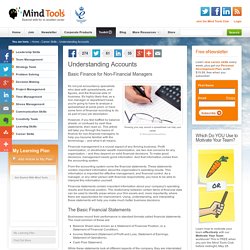
It's highly likely that, as a line manager or department head, you're going to have to analyze a spreadsheet at some point, or have some form of financial recording to do as part of your job description. However, if you feel baffled by balance sheets, or confused by cash flow statements, then read on. Financial management is a crucial aspect of any thriving business. From the accounting system come the financial statements. Financial statements contain important information about your company's operating results and financial position. The Basic Financial Statements. Your mission. Our technology. Idealist.org. NonProfit Library @ Community-Driven Institute. NCNE: Newsletter Editorial; Five Ways of Managing Costs. Newsletter Editorial; Five Ways of Managing Costs.
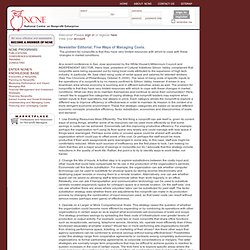
At a recent conference in San Jose sponsored by the White House's Millennium Council and INDEPENDENT SECTOR, Harry Saal, president of Cultural Initiatives Silicon Valley, complained that nonprofits were being squeezed out by rising local costs attributed to the expansion of high tech industry. In particular, Mr. Saal cited rising costs of rental space and salaries for talented workers. (See The Chronicle of Philanthropy, October 5, 2000). The issue of rising costs of specific inputs to the operations of a nonprofit is by no means confined to Silicon Valley, however. 1. NCNE: Helping nonprofits make wise economic decisions. Budget and Finance - Strategy - Structural Complexity. Research - Overview. In the past several years, there has been increased attention to the use of data and information to improve performance in public child welfare administration, policy development and direct service provision.
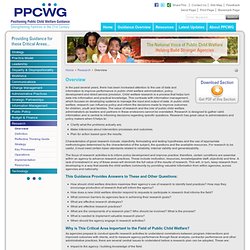
Child welfare research is a process that helps turn data into information and practical knowledge. This contrasts with information management, which focuses on developing systems to manage the input and output of data. In public child welfare, research can influence policy and inform the decisions made to improve outcomes for children, youth and families. The value of research and the role of public child welfare administrators as leaders and partners in these endeavors cannot be overstated. Research is designed to gather valid information and is central to informing decisions regarding specific questions. This Guidance Provides Answers to These and Other Questions: How should child welfare directors maximize their agency’s use of research to identify best practices? Budget and Finance - Key Processes.